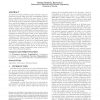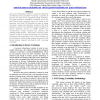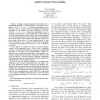1434 search results - page 64 / 287 » Distributed Computing with Imperfect Randomness |
142
Voted
NOSSDAV
2009
Springer
15 years 8 months ago
2009
Springer
In multi-hop wireless networks, random network coding represents the general design principle of transmitting random linear combinations of blocks in the same “batch” to downs...
112
Voted
EUROPAR
2005
Springer
15 years 7 months ago
2005
Springer
Abstract. We address the call control problem in wireless cellular networks that utilize Frequency Division Multiplexing (FDM) technology. In such networks, many users within the s...
90
Voted
HPCA
2007
IEEE
16 years 2 months ago
2007
IEEE
As process technologies continue to scale, the magnitude of within-die device parameter variations is expected to increase and may lead to significant timing variability. This pap...
108
Voted
ICITS
2009
14 years 12 months ago
2009
In this article, we discuss a naive method of randomness reduction for cryptographic schemes, which replaces the required perfect randomness with output distribution of a computat...
154
Voted
COCO
2009
Springer
15 years 8 months ago
2009
Springer
—A simple averaging argument shows that given a randomized algorithm A and a function f such that for every input x, Pr[A(x) = f(x)] ≥ 1−ρ (where the probability is over the...



